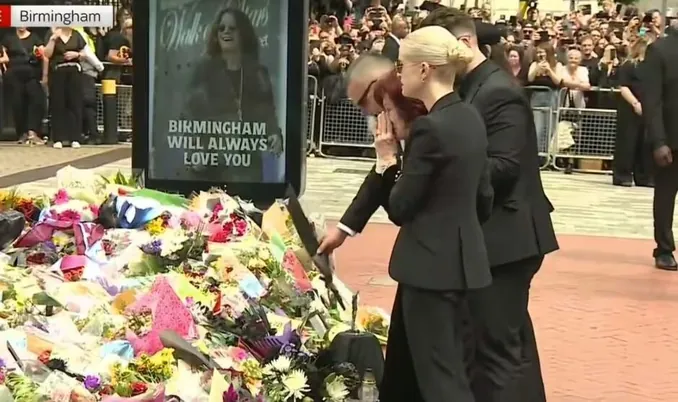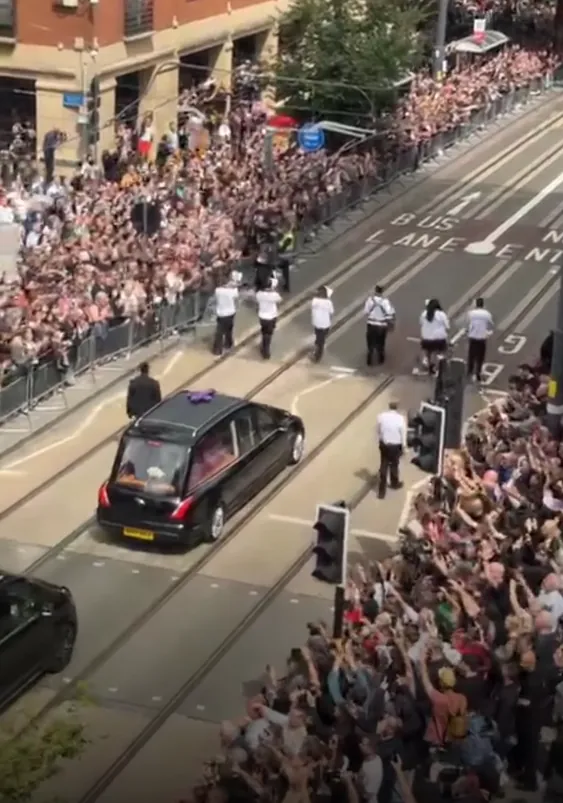Thousands of people gathered in Birmingham, England, to honor Ozzy Osbourne, (watch below).
The public funeral procession took place on Tuesday, July 30, along Broad Street, one of the city’s most well-known areas. Fans lined the route early in the day to pay tribute to the legendary Black Sabbath frontman.
The hearse carrying Ozzy’s body traveled slowly through the crowd, followed by members of his family. The band Bostin’ Brass played live music as the procession moved forward, blending somber melodies with upbeat moments that reflected Ozzy’s larger-than-life personality.
Bench becomes a memorial
The cortege ended at the Black Sabbath Benchnear the Black Sabbath Bridge, a location already filled with flowers, candles, and notes left by fans in the days following his death.
That spot has become an unofficial memorial site. People from across the UK and other countries have visited to leave personal messages, photos, and mementos. A livestream of the bench continues online for those who can’t be there in person.

Earlier private service
Before the public event, Ozzy’s family held a private funeral.
While those details have not been made public, the family made it clear they wanted fans to have their own moment to say goodbye.
“We know how much this moment will mean to his fans,” said Zafar Iqbal, Birmingham’s Lord Mayor, who also helped organize the event. “We’re proud to host it here with his loving family in the place where it all began.”
City support
The public procession was planned quickly but with care. Birmingham City Council worked alongside the Osbourne family, who funded the event, and agencies like West Midlands Police and West Midlands Metro to make sure it went smoothly.
Despite the large crowd and closed roads, there were no major issues. Local businesses and transport services adjusted schedules to accommodate the turnout.
Despite the large crowd and closed roads, there were no major issues. Local businesses and transport services adjusted schedules to accommodate the
Despite the large crowd and closed roads, there were no major issues. Local businesses and transport services adjusted schedules to accommodate the turnout.

A hometown icon
Ozzy was born in Birmingham, and the city often played a role in his life and music. In June, just weeks before his death, he and the original members of Black Sabbath received the Freedom of the City, the highest honor Birmingham can give.
Ozzy also performed at the Back to the Beginningconcert at Villa Park earlier in July. That show, his final appearance, drew over 40,000 in person and millions more online.
A life in music
Ozzy Osbourne helped form Black Sabbath in 1968. The band is widely seen as one of the creators of heavy metal.
Ozzy’s unique voice and unpredictable stage presence made him one of the most recognizable figures in rock history. The band sold more than 75 million albums and influenced generations of musicians.
He also had a successful solo career. His song “I Don’t Want to Change the World” won a Grammyin 1993. In total, he won multiple Grammys and was inducted into the Rock and Roll Hall of Fame twice, once with Black Sabbath in 2006 and again as a solo artist in 2024.
Not just music
In the 2000s, Ozzy and his family became global TV personalities with their hit reality series “The Osbournes”, which aired on MTV and won a Primetime Emmy in 2002.
Ozzy and his wife Sharon Osbourne also created Ozzfest, a traveling metal festival that helped boost the careers of many newer artists.
The first full version of Ozzfest launched in 1997, with acts like Marilyn Manson and Pantera on the bill.
Humor to the end
Despite his healthincluding Parkinson’s disease, a spinal injury, and past substance abuse, Ozzy often spoke with humor about life and death.
In a 2011 interview with The Times of London, Ozzy said he didn’t care what music was played at his funeral. “They can put on a medley of Justin Bieber, Susan Boyle, and ‘We Are the Diddymen’ if it makes ’em happy,” he said. “But I do want to make sure it’s a celebration, not a mope-fest.”
He even joked that he’d like a recording of knocking sounds to play from inside his coffin or a fake video where he asks his doctor for a second opinion on being dead.



